|

“Almost like a real web
site”
|
IN7OMM.COM
• Search |
Contact
• News |
e-News |
• Rumour Mill |
Stories
• Foreign Language
• in70mm.com auf Deutsch
WHAT'S ON IN 7OMM?
7OMM FESTIVAL
• Todd-AO Festival
• KRRR! 7OMM Seminar
• GIFF 70, Gentofte
• Oslo 7OMM Festival
• Widescreen Weekend
TODD-AO
• Premiere |
Films
• People |
Equipment
• Library |
Cinemas
• Todd-AO Projector
• Distortion Correcting
PANAVISION
• Ultra Panavision
70
• Super Panavision
70
|
 |
|
VISION, SCOPE & RAMA
1926
Natural Vision
1929 Grandeur
1930 Magnifilm
1930 Realife
1930 Vitascope
1952 Cinerama
1953
CinemaScope
1955 Todd-AO
1955 Circle Vision
360
1956
CinemaScope 55
1957 Ultra
Panavision 70
1958 Cinemiracle
1958 Kinopanorama
1959 Super
Panavision 70
1959 Super Technirama 70
1960 Smell-O-Vision
1961 Sovscope
70
1962
Cinerama 360
1962 MCS-70
1963 70mm Blow Up
1963 Circarama
1963 Circlorama
1966 Dimension 150
1966
Stereo-70
1967 DEFA 70
1967 Pik-A-Movie
1970 IMAX / Omnimax
1974 Cinema
180
1974 SENSURROUND
1976 Dolby Stereo
1984 Showscan
1984 Swissorama
1986 iWERKS
1989 ARRI 765
1990 CDS
1994 DTS / Datasat
2001
Super Dimension 70
2018 Magellan 65
•
Various Large format
| 70mm to 3-strip |
3-strip to 70mm |
Specialty Large Format |
Special Effects in 65mm |
ARC-120 |
Super Dimension 70
| Early Large Format
• 7OMM Premiere in
Chronological Order
7OMM FILM & CINEMA
• Australia |
Brazil
• Canada |
Denmark
• England |
France
• Germany |
Iran
• Mexico |
Norway
• Sweden |
Turkey
• USA
LIBRARY
• 7OMM Projectors
• People |
Eulogy
• 65mm/70mm Workshop
• The 7OMM Newsletter
• Back issue |
PDF
• Academy of the WSW
7OMM NEWS
• 2026 | 2025 | 2024
• 2023 |
2022 |
2021
• 2020 |
2019 |
2018
• 2017 |
2016 |
2015
• 2014 |
2013 |
2012
• 2011 |
2010 | 2009
• 2008 | 2007 |
2006
• 2005 | 2004 |
2003
• 2002 |
2001 |
2000
• 1999 |
1998 |
1997
• 1996 |
1995 |
1994
|
|
in70mm.com Mission:
• To record the history of the large format movies and the 70mm cinemas
as remembered by the people who worked with the films. Both during
making and during running the films in projection rooms and as the
audience, looking at the curved screen.
•
in70mm.com, a unique internet based magazine, with articles about 70mm
cinemas, 70mm people, 70mm films, 70mm sound, 70mm film credits, 70mm
history and 70mm technology. Readers and fans of 70mm are always welcome
to contribute.
•
Disclaimer |
Updates
• Support us
• Testimonials
• Table of Content
|
| |
| |
Extracts and longer
parts of in70mm.com may be reprinted with the written permission from
the editor.
Copyright © 1800 - 2070. All rights reserved.
Visit biografmuseet.dk about Danish cinemas

|
| |
The Shoes Of The Fisherman
Roadshow-Performance in 70mm & stereophonic sound in The Astor Film Lounge (Berlin) |
Read more at
in70mm.com
The 70mm Newsletter
|
| Written by: Gerhard Witte, Berlin |
Date: 08.11.2009 |
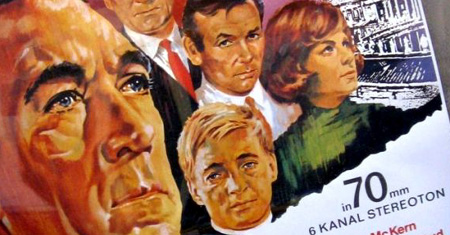 Showcase advertisement. Picture from Gerhard Witte. Showcase advertisement. Picture from Gerhard Witte.
On October 25, 2009 a 70mm Gala Matinee of the MGM film "The Shoes of the Fisherman" (USA 1968) took place in the Astor Film Lounge in Berlin on the occasion of the 25th anniversary of the death of the actor Oskar Werner (13.11.1922-23.10.1984).
The event was organised by the “Kinomuseum Berlin e.V.“ and the culture magazine “Spirit – ein Lächeln im Sturm“.
The 70mm print was kindly provided by Jean-Pierre Gutzeit (Kinomuseum Berlin e.V.) who has been researching and collecting wide-screen materials for many years.
Marc Hairapetian, freelance film reviewer and editor of the culture magazine „Spirit – ein Lächeln im Sturm“ and Mr. Gutzeit gave a short introduction before the performance.
|
More in 70mm reading:
In den Schuhen des Fischers
Berlinale 2009 - Astor Cinema
The Grindel Filmtheater
Das Grindel Filmtheater
|
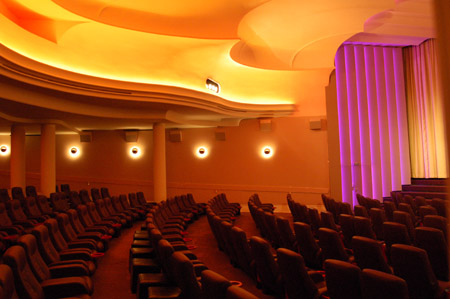 The Astor Film Lounge. Picture by Thomas Hauerslev. The Astor Film Lounge. Picture by Thomas Hauerslev.
They discussed the life of Oskar Werner, followed by some information about the way 70mm 6 channel sound films used to be made, utilising directional dialogue in a way seldom heard in present day cinema. The superb music by Alex North was recorded with an orchestra of up to 100 musicians, and included some of the music from his rejected score for "2001: A Space Odyssey", UK/USA 1968).
The print shown at this performance was the German language Road Show version, with a running time of 156 minutes, including Overture, Intermission and Play-out music.
It was a good occasion for the Berliners to revisit the world of 70mm movies, after the last retrospective named “70mm-Bigger than Life“ at the February 2009 film festivals.
|
|
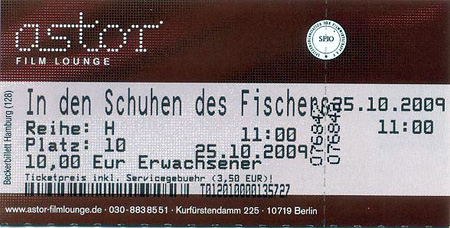 The performance took place at Astor Film Lounge, formerly known as Filmpalast Berlin, Germany’s first Premium cinema which was opened in December 2008 in the boulevard “Kurfürstendamm“, which used to be Germany’s No. 1 cinema street. Since the construction of various multiplexes, the new cinemas on Potsdamer Platz and the arrival of DVD with home cinema systems, many of the Kurfürstendamm cinemas faced difficult times. The performance took place at Astor Film Lounge, formerly known as Filmpalast Berlin, Germany’s first Premium cinema which was opened in December 2008 in the boulevard “Kurfürstendamm“, which used to be Germany’s No. 1 cinema street. Since the construction of various multiplexes, the new cinemas on Potsdamer Platz and the arrival of DVD with home cinema systems, many of the Kurfürstendamm cinemas faced difficult times.
Traditional houses such as the original Astor (located in the intimacy of the new Astor Film Lounge), the Filmbühne Wien, the Marmorhaus, the Gloria-Palast, the Hollywood, the Lupen and the Royal Palast (the main auditorium of which had a screen of 32x13 metres, which was listed in the The Guinness Book of Records) fell victim either to the wrecking ball or gutting. One of the most popular cinemas on the Ku`damm, today, The Astor Film Lounge, has been preserved for the Berliners. The Berlin Cinema Museum has organised an exhibition in the foyer, and this is attracting a great deal of interest.
|
|
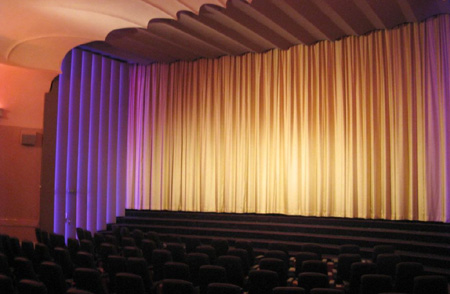 View of the curtain. There is also a balloon curtain located behind that. Picture from Gerhard Witte. View of the curtain. There is also a balloon curtain located behind that. Picture from Gerhard Witte.
Because the cinema is located behind and not directly on the famous boulevard, it has, fortunately, not been of interest to property developers, such as fashion stores.
The building has a long history. It was opened in 1948, as “KiKi” (Kino im Kindl). In 1951 the Berlin cinema architect Gerhard Fritsche redesigned it and this work has been basically preserved. In 1956 the UFA-Theater Aktien-Gesellschaft took it over and renamed it The UFA-Pavillon. In 1963/64 the theatre was extended and the auditorium redesigned to take the larger CinemaScope screen, by the architect Wolfgang Rasper. After Hans-Joachim Flebbe was accepted as the new tenant, further renovation and maintenance works took place in 1988, within the constraints of the Preservation of Historical Monuments regulations and at this time the cinema acquired a new Philips DP70 projector and the name Filmpalast Berlin
and today…The Astor Film Lounge.
|
|
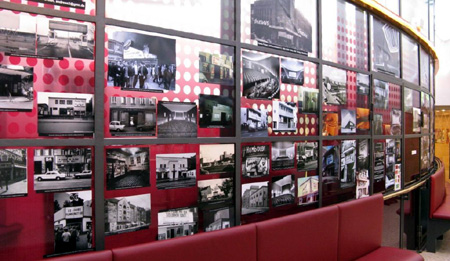 Picture gallery of the “Kinomuseum Berlin e.V.“ about old famous cinemas in Berlin presented in the foyer of the “Astor Film Lounge“, October 2009. Picture from Gerhard Witte. Picture gallery of the “Kinomuseum Berlin e.V.“ about old famous cinemas in Berlin presented in the foyer of the “Astor Film Lounge“, October 2009. Picture from Gerhard Witte.
The cinema operator Flebbe has described its strategy as the beginning of a new era and is transforming heritage protected cinemas into lounges.
The cinema now has a doorman, valet parking, welcoming drinks, ushers, finger food (no popcorn) and other refreshments, and is unusual amongst the profusion of Berlin cinemas in having 250 comfortable kingsize leather chairs with plenty of legroom and even footstools!
The following projection formats are available for the shallow curved 13,2 x 5,8 m silver screen: 35mm/70mm/D-Cinema/3 D, with a 6000 watt sound system.
Of course, this high class service comes with a higher admission price of 10 to 15 Euros.
|
|
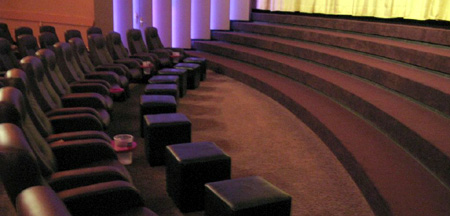 Comfortable seating. Picture from Gerhard Witte. Comfortable seating. Picture from Gerhard Witte.
"The Shoes of the Fisherman", also known in Germany as "Der Gesandte von Moskau" and premiered in 70mm Cinerama cinemas, was directed by Michael Anderson, based on the novel by Morris L. West. It was made in 35mm anamorphic, with 70mm 6 channel magnetic sound blowups made for some larger venues.
|
|
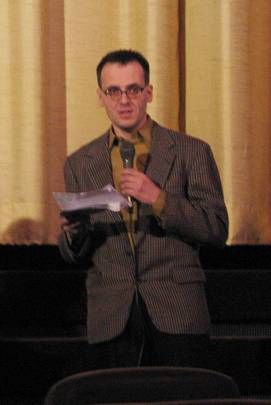 Introduction from Mr. Gutzeit. Picture from Gerhard Witte. Introduction from Mr. Gutzeit. Picture from Gerhard Witte.
The print from Mr Gutzeit's archive was well received. In some sequences there was colour fading, typical of the Eastman Color Print stock of that time, but it wasn't severe, with many sequences seemingly unaffected. There were very little visible print damage.
Much of the film was as crystal clear and sharp as we expect from the classic panorama movies of the 60s. On the other hand there were some sequences, especially location shots, which were lower quality and grainy, implying that some of the original 35mm material was probably not suitable for 70mm blow up. This appeared to be true of the Catholic Mass on the Domplatz, where filming conditions necessitated the use of telephoto lenses.
The analogue 6 channel magnetic sound sounded wonderful without any distortion on high level brass and cymbal crashes, despite being made before the invention of noise reduction, and, all in all, it was a magnificent reminder of how widescreen epics used to sound.
|
|
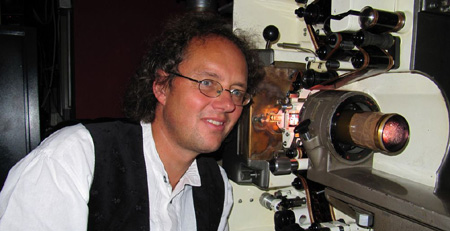 Photo in the projection room of the “Astor Film Lounge“: Uli Schmidt in action working with the DP70 Projector. Picture from Ulrich Schmidt. Photo in the projection room of the “Astor Film Lounge“: Uli Schmidt in action working with the DP70 Projector. Picture from Ulrich Schmidt.
Although it would have been preferable to have had an original English language print, the quality of the German dubbing reflected well upon the high standard of post-production at the time it was made.
Some 100 cineastes attended the screening.
It was a pity that The Intermission was way too short but it was owing to the time pressure of the following movie. I would like to express my thanks to the organisers of “Kinomuseum Berlin e.V.“ as well as “Spirit – ein Lächeln im Sturm“ and the host, „Astor Film Lounge“, for this special cinema event and I hope, that further screenings in the 70mm format will follow.
|
|
Additional Links |
|
The “Astor Film Lounge“ and the former “Filmpalast Berlin“ are being described by the Berliner Kinokompendium at:
The association “Kinomuseum Berlin e.V.“ (Board of managers: Jean-Pierre Gutzeit, Uwe Borrmann, Joachim Kelsch) get involved in preserving, arching and maintaining the historic and ongoing cinema culture (according to the original form).
The culture magazine “Spirit – Ein Lächeln im Sturm“ www.spirit-fanzine.de deals with Hollywood acting stars, directors and film musicians of the 1960s and is being published by the film reviewer Marc Hairapetian.
|
|
| |
|
Go: back - top - back issues - news index
Updated 08-11-09 |
|
|
|